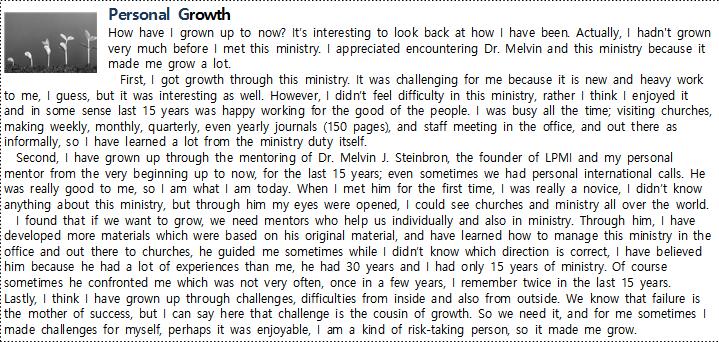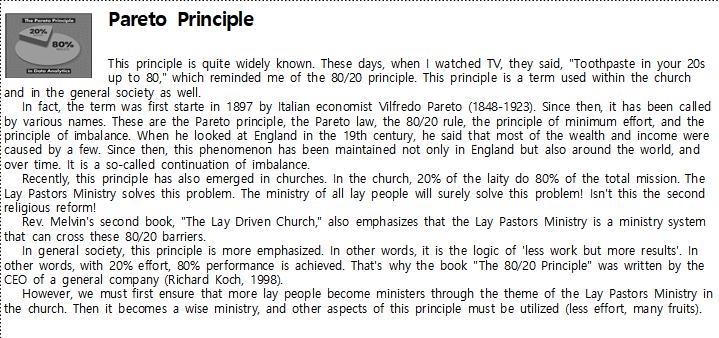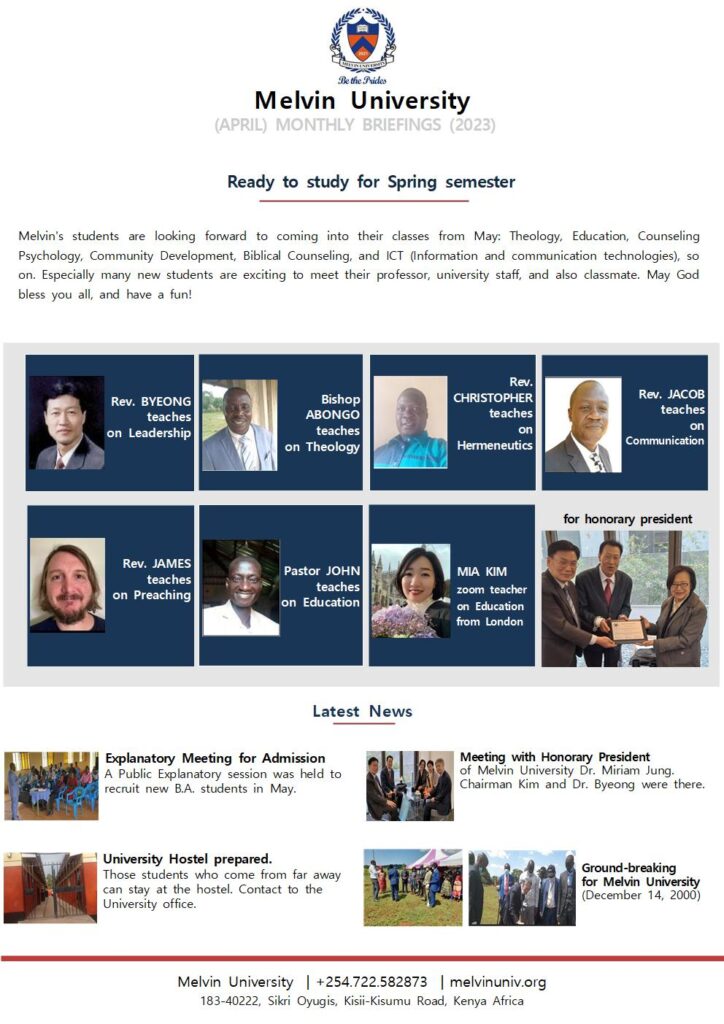#46

Peter, an apostle of Jesus Christ.
 The Caller, Peter, identified with the elders of the churches by placing him-self alongside of them (not over them) as a fellow elder. He was practicing what he preached – “Humbly ourselves, therefore, under God’s mighty hand that he may lift you up in due time.” As one of the Twelve, “a witness of Christ’s sufferings,” Peter had apostolic authority to summon others to partner with him in pastorally caring for members of their churches. Peter established his authority in the salutation of his letter to these churches, “Peter, an apostle of Jesus Christ.” Your pastor also has authority to call people to be lay pastors. But let’s not confuse authority with power. Power coerces. i.e. forces a person against his or her will. Only our Lord has pow- er, but because of his respect and love for people, when he calls, people feel inwardly compelled without having their free will violated. He promises us who respond that his Spirit will be present to make our ministry successful, and to make our life on earth the greatest life a human being can have.
The Caller, Peter, identified with the elders of the churches by placing him-self alongside of them (not over them) as a fellow elder. He was practicing what he preached – “Humbly ourselves, therefore, under God’s mighty hand that he may lift you up in due time.” As one of the Twelve, “a witness of Christ’s sufferings,” Peter had apostolic authority to summon others to partner with him in pastorally caring for members of their churches. Peter established his authority in the salutation of his letter to these churches, “Peter, an apostle of Jesus Christ.” Your pastor also has authority to call people to be lay pastors. But let’s not confuse authority with power. Power coerces. i.e. forces a person against his or her will. Only our Lord has pow- er, but because of his respect and love for people, when he calls, people feel inwardly compelled without having their free will violated. He promises us who respond that his Spirit will be present to make our ministry successful, and to make our life on earth the greatest life a human being can have.
Hear Peter again: “Each one should use what ever gift he has received to serve others, faithfully administering God’s grace in its various forms.” He made it very clear that every believer receives ministry gifts and he expected elders who had pastoring gifts – e.g. mercy, encouragement, empathy – to respond to his call. Today’s pastors have the right to expect the same. Actually, there are two Callers – the pastor who has the authority to sound the call…and Jesus, whose powerful love draws out a “yes” response. Like-wise, people have two receptors: ears which hear the pastor, and spirits which hear Jesus. Among all the members of the church, those who hear the pastor’s call (the audible voice), and at the same time hear Jesus’ call (“the still small voice”), are those whom our Lord has chosen to be shepherds. The pastor-caller needs to lay down four requirements: (1) Love Jesus–Before Jesus called Peter to take care of his sheep he asked, “Do you love me?” (2) Love people–“Love one another.” (3) Discover your spiritual gifts– aka “gift abilities.”(4) Be equipped–“Pastors and teachers are to prepare God’s people for ministry.” The Home Depot runs a different kind of business (home improvement) but has the same idea: “You can do it; we will help you.” Ask your pastor if the call to be a lay pastor is right for you.
from the Short Paper
COMMENTS
in relation to THE CALLER: “A FELLOW ELDER”
 Byeong, Melvin University, says:
Byeong, Melvin University, says:
According to Ep. 4:11-12, “Pastors and teachers are to prepare God’s people for ministry.” How do you see it and what’s mean to pastors and laypeople?
Lay Pastors Ministry in Korea I better talk about LPM Korea and LPM in the Korean churches. First, LPM Korea. We formally started in July 1999. I have prepared 2-3 years before formally launched. I trained a couple of church with PACE, and those among lay pastors a few people started with me.1 I can say three stages in our staffs, we called ourselves “staff” of LPM Korea. First time, very pure 3-4 lay people came and started together, actually they are founding member of LPM Korea. I trained them at their church and they became our staff. Soon I mean they understood and they think this ministry is meaningful, and through this they might grow so they came and still stay with this ministry for 15 years, for longevity.
We met together almost every day and every week, talk about this ministry, vision, practical strategy for local churches and national level. Through one staff Rev. Lee, another person came to our office, he was working as part-time at Christian Newspaper.2 Actually then he came for interview with me about this ministry, we talk a lot about the ministry, and finally he became our staff. Through him I can write columns on the newspaper of this ministry every week regularly for next two years, almost 100 times of columns….of course with my photo, so people got to know who I am and what I do for churches. Through his help we can advertise our seminar and conferences.
 Tomas V. Parrish, MN, USA writes,
Tomas V. Parrish, MN, USA writes,
Close Encounter of the Miraculous Kind: Does the Lord Jesus endorse the Lay Pastors Ministry? Recently I had firsthand experience on the miraculous that confirmed to me the reality that the Lay Pastors Ministry is truly blessed and endorsed by the Lord.
My wife, Jan, and I recently completed a 28-day mission trip to Bangladesh and Japan.
We saw the Lord’s hand and power in a variety of ways. As we were preparing to leave Tokyo on July 7th for Honolulu, we had an incredible experience.
Once we had boarded the plane and settled in, an elderly gentlemen took the aisle seat next to us. After takeoff I introduced myself and he told me his name was Alfred Winroth. It turns out that Alfred was a soldier in occupied Japan a the end of WWII and then returned to Japan as a missionary for the past 42 years.
We talked off an on during the six hour flight regarding the beauty and talents of the Japanese. We also spoke of the great indifference they have towards spiritual matters and the difficulty this creates for evangelism. Alfred told me of his longtime work and that he had collaboration in the Gospel with some of the giants of the faith. This list included Billy Graham and Mituso Futchidam, who led the sneak attack on Pearl Harbor and later became a Christian evangelist.
As the flight was coming to a close, Alfred told me that he was traveling to Honolulu to take a fantastic book regarding Christian care of the congregation to a young pastor. He reached into his bag and pulled out Can the Pastor Do It Alone? written by Dr. Melvin J. Steinbron.
This is the very book I wrote one chapter in at Mel’s request thirteen years ago. I looked over my wife, Jan, in astonishment and she looked just as amazed as I. I told Alfred that I know the book well and that I had written one chapter in the book. I showed him the chapter and shard my personal experience and endorsement of the Lay Pastors Ministry since the book was written. Alfred gave me the name of the young pastor he was going to meet to give the book to, and I had the pleasure of taking with this pastor several days later
What are the numerical odds of such an encounter? I can’t even begin to calculate. What I did realize, after the shear shock subsided, was a deep, inner conviction that the Lord Jesus was endorsing the Lay Pastors as the ministers of the body of Christ.
I believe that the Lay Pastors Ministry is not just one more program among many, but truly the inspired directing of the Holy Spirit for the care of Christ’s body on earth.
(Tom Parrish came to Korea for the Conference of the Lay Pastors Ministry in June 2010.)
 And one day, I got a phone call from publisher that told me they want to publish my translated book of Melvin’s, Can The Pastor Do It Alone? Then I told them I don’t have money to publish so they said they can publish with their pay, so it was published smoothly. At final stage Dr. Sangbok David Kim proofed whole of manuscript and then published 2000 copies at first. It was 14 years ago, in the year of 2001.3 After LPM institute open in Korea( July 1999), the first national conference was held in 2,000, and the following year we published formal book and sold in public, e.g., our books jump into every Christian book stores in Korea, therefore ,many people got to know this ministry.
And one day, I got a phone call from publisher that told me they want to publish my translated book of Melvin’s, Can The Pastor Do It Alone? Then I told them I don’t have money to publish so they said they can publish with their pay, so it was published smoothly. At final stage Dr. Sangbok David Kim proofed whole of manuscript and then published 2000 copies at first. It was 14 years ago, in the year of 2001.3 After LPM institute open in Korea( July 1999), the first national conference was held in 2,000, and the following year we published formal book and sold in public, e.g., our books jump into every Christian book stores in Korea, therefore ,many people got to know this ministry.
Through columns of every week, book published, seminars here and there, and communicates quite often with Melvin, our ministry was growing, and right after conference of Hallelujah church, they opened PACE Training Center in the church, so next 10 years they trained and produced more than 1,000 lay pastors. After conference, pastors David Kim himself taught pastoral staffs, Elders group and deacon/deaconess group in turn, most leaders of the church understood what the Lay Pastors Ministry with PACE was .After they have officially opened PACE Training Center aftermath.
ADDITIONAL COMMENT
by BYEONG
Adaptation leadership: When we talk about leadership in general, we have been going from “primary leadership to open-minded, empowering leadership to leadership that let them decide.”
But since it’s a global era, if we go to another country with people from other countries, will it work if we show the leadership we used to do in our own country? It may be similar to what happens when a new daughter-in-law enters in our family. It’s hard at first because we don’t know each other well.
When I first came to Melvin University, I had such a difficulty because the culture was so different. In particular, the concept of time was so different from that of Korea. At that time, I once made an appointment with the vice-president at the school office, but he didn’t show up after three hours of the appointment. When I asked where he was, he said he was meeting someone in the city and would come soon. I was waiting longer again, but he doesn’t come. So I went to a place downtown where he is and just got angry very much. (I have a straight personality, too.) “Why don’t you keep your promise?” He seemed to be talking about the school with the head of our university’s faculty. Both seemed very surprised because of my resentment. They said they couldn’t keep the appointment with me because they were talking.
As I later found out, Kenyans had no “punctual.” One of our students told me of it. Because the student studied in England, so he seemed to know the problems of his own country. For example, if they promised to meet at school at 9 o’clock, it is common to show up around 11 o’clock. I think it’s a concept that they only have to show up before sunset. Of course, it’s been fixed a lot since they were born.
In a way, there were problems on both sides. They didn’t know each other’s culture at all. One must be a thorough concept of time (punctual), the other must have grown up without such a concept, etc. In the end, will you adapt to other cultures in a word? It seems to be a matter of what to do. There are many multiculturalities in Korea, and as the global era is becoming more and more, such problems will emerge.
Will I adapt to the world? Will the world adapt to me? Irish writer George Bernard Shaw says that rational people adapt themselves to the world, and irrational people continue to insist that the world adapt to them. Most of the time, however, it is the latter. It can also mean that everyone is living in such a conflict that they want the other person to suit us. It is also proof that it is difficult for me to adapt to others. The reason may be that we don’t want to lose, or get rid of, our own style. Maybe we’ve been stuck in the winner mold for a long time.
It is also said that such a gap should be solved in theory, but the reality is that it does not work in practice. Looking at the book “Global Dexterity” (by Andrew L. Molinsky, 2013), there are three key challenges ahead of us when we come into contact with other cultures, when we work with people from other cultures, and when we try to adapt to other cultures.
The first is the feeling that we ourselves are not ready to adapt to other cultures in terms of knowledge or skills. In my case, I have visited many foreign countries, but it is my first time in Africa, and moreover, I have been in Kenya for two years full-time, and I have been in an intensive managerial position, so it is true that I lacked “basic knowledge” about Africa.
The second challenge in this book is my own past lifestyle, my own understanding of other cultures, and “my own beliefs.” After all, it’s a challenge to myself. Personally, I like it because I (Byeong) myself have a strong belief in something, but there seems to be something to be revised in working with foreigners for a long time. I often feel that the development, vision, and direction of Melvin University in my own opinion cannot be achieved without the cooperation of the Kenyan staff here.
The third was that adapting appropriately to other cultures would be a burden and pain. I don’t think that’s the case with me. I think it’s because I tend to keep up with it rather than being a burden. However, as this book says, it is necessary to proceed without being disturbed by our own ministry. I think it is necessary to adapt well without interfering with the progress.
The conclusion is how to overcome the above three challenges and demonstrate our leadership as a leader to reach our desired goal and final destination well. Of course, it is clear that these are not easy to overcome. Wasn’t I also very angry at first?
However, if vision, direction, and purpose are clearly shared with each other, of course this will take time, but it will be the best, and it will be solved well.

중요한 결정
“배고플때는 중요한 결정을 하지말라”는 말이 있는데 의미있는 조언이라고 본다. 우선 배고플때는 아무것이나 허겁지겁 먹게되어 분명히 체하거나 탈이 난다는 것이겠다. 그리고 그럴 때는 감정이 마구 섞여 사리판단이 흐려져서 잘못 결정을 내릴 확률이 높다는 것이겠다. 좀더 시간을 갖고 가볍게 먹고 허기를 면한 후에 가부의 결정을 다시 검토해보라는 의미일것이다. 우리는 종종, “야, 흥분을 가라않히고 얘기해!”라는 장면을 일상이나 tv에서도 보곤한다. 같은 맥락의 예라고도 보겠다.
최근에 우리 대학교에서도 이와 비슷한 경험이 있는데 직원을 내보내는 일이 있었다. 이것은 지금도 진행중에 있다. 주요한 두가지 문제가 있어서 인데 그것은 우리 직원들 뿐만아니라 여기 케냐사람들의 특징인것 같다. 두가지인데 하나는 시간에 대한 개념이고 다른 하나는 돈을 썼을때 영수증을 안 챙기는 습관이다. 이것은 학교 행정에 치명적인 결과를 가져오고 또 사람들에겐 상처를 주기도 하는 것이다.
왜 그런고 하고 생각해보니 아프리카 사람들은 어렵게 살고 각박하게 살다보니 시간맞추는 것에 신경을 오랬동안 안써온 것 같다. 벽시계가 있긴한데 시간에 대한 개념이 없는 것이다 (벽 시계가 없는 집도 많다). 몇 번 겪다보니 신경질도 나서 혹시 시간맞춘다는 punctual이라는 단어를 아느냐라고 물으니 모른다는 것이었다. 그러니 오면 오는 것이고, 늦게 오는 것에 부담을 전혀 못느끼고 또 안느끼는 것이다. 몇시에 간다라고 얘기해놓으면 그날 내로 가면 된다는 생각들이다. 그런데 다른 사람들도 그것을 받아들이는 것 같다. 10시에 약속해놓고 11시까지 기다리다가 왜 이렇게 안오는거야! 라고 짜증내면 기다려봐 곧 올거야. 그리고 오후 두시쯤에 나타나면, ‘봐 오 잖아’ 라고 아무일 없다는 듯한 표정이다. 나같이 시간 지키기에 예민한 사람은 함께 일하기가 정말 쉽지않다. 결국은 이방인인 우리가 지고 만다. 그냥 수긍하고 그 문화를 받아들여야 견디지 안 그러면 정말 미쳐버릴수도 있다.
영수증을 안 챙기는 것은 그것도 오랜 습관인데 그렇게 할 물건도 사본 일이 없고, 사더라도 영수증을 굳이 받아와야 할 이유를 못 느끼는 것이다. 어릴때부터 그랬던 것 같다. 그러나 이것은 나는 이해하지만 우리 학교를 후원하는 사람들, 특히 멜빈대학교 이사진들에게 치명적인 결격사유가 될 수 있다. 어쩌면 나 나 학교 직원들에 대한 신뢰와 관계된 것이기도 하다. 이런 사람들을 내보내야 하는가 말아야 하는가가 현재의 당면 과제이다. 한번 만나면 영원히 함께 간다는 생각을 갖고 있는 나에게는 쉽지않은 결정 순간이 다가왔다.
멜빈목사님께서도 “사람들이 들어오기도 하고, 또 떠나기도 한다”는 말씀을 해주신 적이 있었는데 그것이 내게 위로가 된 적이 있었다. 사역을 오래하시다보니 그런 경우를 많이 겪으신것 같다. 나는 그 당시 우리 연구소의 스탭들은 안 헤어지고 영원히 함께 간다는 생각을 갖고 있었기에 누군가 떠난다는 것은 받아들이기 힘든 일이었다. 그러나 시간이 지나면서, 우리 사역이 싫어서가 아니고 이런 저런 개인사정으로 떠나는 것은 기꺼이 보내드리는게 맞다고도 생각하게 되었다. 멜빈목사님께서도 이런 경우를 내게 얘기하신 것이다.
사실, 결정에 있어 지나치게 충동적인 사람들이 있긴하다. 며느리가 조금 뭘 잘못했다고 헤어지게 만드는 사람들. 즉 홧김에, 순간적인 판단에 큰 일을 그르치는 경우도 있다. 또한 자신의 입장에서만 매사를 결정하는 사람들도 있다. 작은 일에 이런 저런 실수를 하는 것은 괜찮지만 중요한 일에서 이런 충동적인, 마치 배고프니 폭식하는 것과 같은 행동을 해서는 안된다는 얘기일 것이다.







